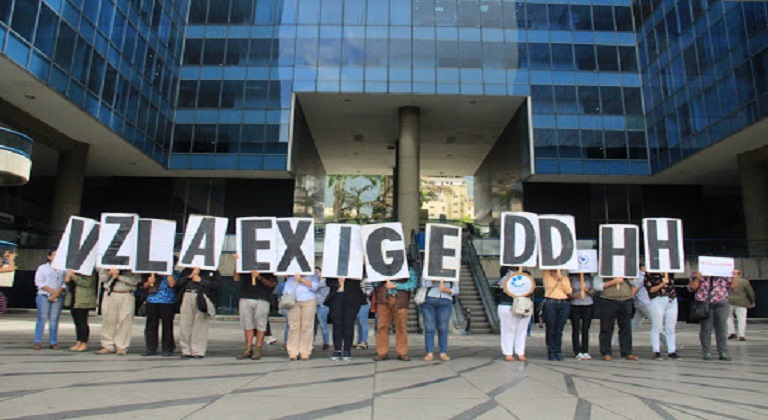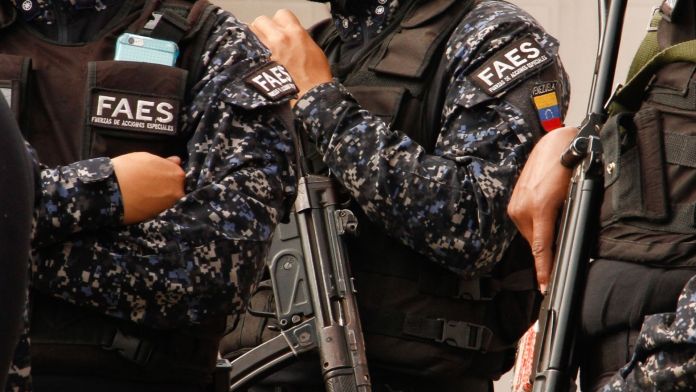With an estimated population of 1,642,300 people, the state of Aragua consists of 18 municipalities. It is the fifth most populous state in Venezuela, and its capital is the city of Maracay. Like the rest of the country, Aragua is going through a Complex Humanitarian Emergency that severely affects and violates the human rights of its population, especially the right to access to basic services, the right to health and the right to education, according to the Aragua based Grupo Interdisciplinario para la Emergencia Humanitaria Compleja (The Interdisciplinary Group for the Complex Humanitarian Emergency, GIEHC).
The water supply in the state of Aragua is of poor quality and unreliable. Sewage often overflows and the solid waste collection, transportation and disposal system is inoperative. No improvement has been observed in three of the fundamental problems of the health sector, namely the lack of medical-surgical supplies, the deterioration of infrastructure and the living conditions of medical and paramedical personnel. In general terms, access to education has not improved either, and during election times, school facilities were used for political campaigning and as campaign headquarters.
- Worryingly, water service has been estimated to be unstable 50 to 70 percent of the time since the last quarter of 2021. This means that many people have to go, even on foot, to a water source or filling site and carry the containers back to their homes. Power outages in the states of Carabobo or Aragua especially affect water service in the Santos Michelena municipality, as it is the final link of the Central Regional System, forcing the residents to fetch water from unsafe sources.

- In late 2021, local media reported that some communities continued to receive cloudy and smelly water due to failures in the purification process and the poor condition of the pipes, which have lost pressure. The little water they receive is of very poor quality, often leading to gastrointestinal disorders and eye and skin diseases. Some private condominiums have managed to drill wells on their own to overcome the neglect of the Venezuelan State. The lack of adequate water impoverishes people’s lives.
- Sewage overflow on the streets of residential neighborhoods and disadvantaged communities of Aragua has shown a notable increase. The regional company in charge of carrying out the repairs, AC Hidrológica del Centro (Hidrocentro), is not adequately funded to undertake these works.

- The southern area of Maracay is affected by the flooding of Lake Valencia, and the lack of sanitation is causing the pipes of the sewage network system to collapse, becoming a collateral problem to the expansion of the lake. In practice, there is no response from the authorities regarding the replacement of the collectors due to a lack of both funding and personnel.
- Regardless of the area (higher or lower grounds), sewage is overflowing through toilets, and washing machines, sinks and toilets do not drain. Faced with this situation, many people have been forced to close down their bathrooms. Hidrocentro has been urging families to break loose the cachimbos, the embedded pipes that connect with the collectors, so that water flows and probably lets the sewers drain.
- Serious deficiencies in the collection and disposal of solid waste, under the competence of the municipalities, have increased. In the last two years, waste collection has not employed specialized vehicles such as garbage trucks. The vehicles employed are not specialized for the service and leave waste scattered in the streets. Garbage collection, which must take place three times a week, is at times delayed by more than a month due to unavailability of vehicles, frequent fuel shortages or broken down equipment.
- The lack of waste collection is affecting the health of the population. The decomposition of organic waste attracts mosquitoes, flies, rodents, worms and bacteria. To prevent health risks, residents deposit the garbage in irregular open-air dumps on the edge of the main roads of Maracay. Sometimes the waste is set on fire, which constitutes a cause of respiratory conditions and a public health issue.
- Both in hospitals and the outpatient network of the public health system, people have to bring their own supplies for treatment, to the point of being asked to bring the anesthesia in the case of emergency surgeries, a supply that used to be banned for sale to the public. Health facilities no longer provide medical cotton or gauze to treat a wound, pain or other condition.
- The lack of medical supplies is even more evident in large public hospitals. Whenever a patient arrives, they are asked to bring their own syringe and medication, and they must go out to get them, even in pain. The same is true for surgical supplies, both for emergency and elective interventions. People with chronic health conditions such as kidney disease do not have access to medical treatment. The primary health facilities of the Barrio Adentro program do not even have a sphygmomanometer, while personnel at the Comprehensive Diagnostic Centers (CDI) ask patients to bring their own paper for the prescriptions.
- In general, health infrastructure is in very poor condition. Sometimes health centers are painted on the outside, but the lack of access to basic services such as drinking water or electricity remains unsolved. The core problems of a hospital are not addressed, including having adequate medical beds, a well-equipped operating room, nebulization areas, or a constant supply of oxygen for treatment. Some hospitals do not have regular water service, and doctors wash their hands with one gallon of water that they must bring from home. Personnel or cleaning and maintenance products are also in short supply in health centers. Some have collapsed sewage pipes, thus posing a sanitary risk. Sometimes the anesthesia machine is out of order and people have to be referred to other health centers with an available operating room.
- The working conditions of health personnel are so adverse that, in most cases, they end up moving abroad. As of the date of this report, the monthly income of medical personnel in public hospitals is approximately 130 bolívares, equivalent to USD 30. These wages are not sufficient to cover their minimum living expenses. Health workers frequently state that they cannot go to work because they have nothing to eat at home.
- Health personnel works in shifts of up to 24 hours without access to water or dining rooms, and a worrying weight loss has been reported among them. Nor can they always travel to health centers, or they only go to work one or two days a week, due to the lack of public transit and the high fares of the few units that remain in operation. Added to this is the fact that those who own a car have no access to subsidized fuel, and those who do not have the subsidy lack public transportation to go to their workplace. This makes the staff arrive late and tired. During the COVID pandemic, a significant number of doctors, nurses and other health workers died because they did not have biosafety supplies to protect themselves during work. Those who survived a COVID infection now face health conditions that complicate the exercise of their profession.
- Children with severe malnutrition die in the pediatric service of the hospital due to the unavailability of medical treatment. It has been found that most of these children have been left behind by families who migrate and leave them in the care of their grandparents, whose Social Security pensions are 130 bolívares a month. When hospital kitchens receive food supplies, it is just rice and grains. Most of the time there is no food at all, and kitchens must close and food cannot be offered to the patients, with whom the staff often shares the little food they bring. This situation has given rise to the difficult decision to discharge the patients prematurely, including women in labor who still require obstetric care.
- Instead of seeing a revamp of educational facilities, most of which under the management of public agencies, thefts and the dismantling of schools intensified during the COVID pandemic. Nor has access to public services improved, including connectivity. Unhealthy conditions prevail in public schools due to a lack of running water, cleaning supplies and sanitation personnel. Most parents and teachers agree that the conditions for returning to face-to-face classes are not met.
- Teachers leave their workplaces because their wages are too low and they must find other ways to earn a living. This has opened the doors to unqualified personnel from Mision Chamba Juvenil, a government-sponsored job program Some teachers, however, offer tutored homework services at $10 a class, and parents prefer to take their children to the teachers’ homes rather than to schools. The Social Welfare and Assistance Institute for the Staff of the Ministry of Education (IPASME for its acronym in Spanish) has been closed for two years and teachers were left without any type of social security. Teachers who denounce the poor conditions of schools are subject to administrative procedures in retaliation.

- Only rice is served at schools in the state of Aragua, where the theft of kitchen equipment and lack of cooking gas is systematic. All this hinders the adequate operation of the School Food Program (PAE). It has been observed that personnel that works in school kitchens under the National School Food Corporation (CNAE) have left their posts and migrated to other economic activities due to low wages and poor working conditions.
- Teachers often have to collect money to buy cooking gas to prepare the student’s meals. The cease of operations by the School Food Program causes children and teenagers to drop out of school and work to buy food. Earning some money to buy food is so difficult that children, teenagers and their families are forced to migrate. Schooling is no longer relevant for children and their families, and in some communities, it is common to see them doing informal jobs.
- Elderly people who live alone and rely on a pension, public cash transfers and a few bags of food from the Local Supply and Production Committees (CLAP), do not have enough money to feed themselves, much less to buy their medicine. Community leaders responsible for the CLAP and other politicized local structures fail to take care of malnourished older adults. Residents have denounced that their food is sometimes taken away regardless of their condition.
Translated by Jose Rafael Medina




